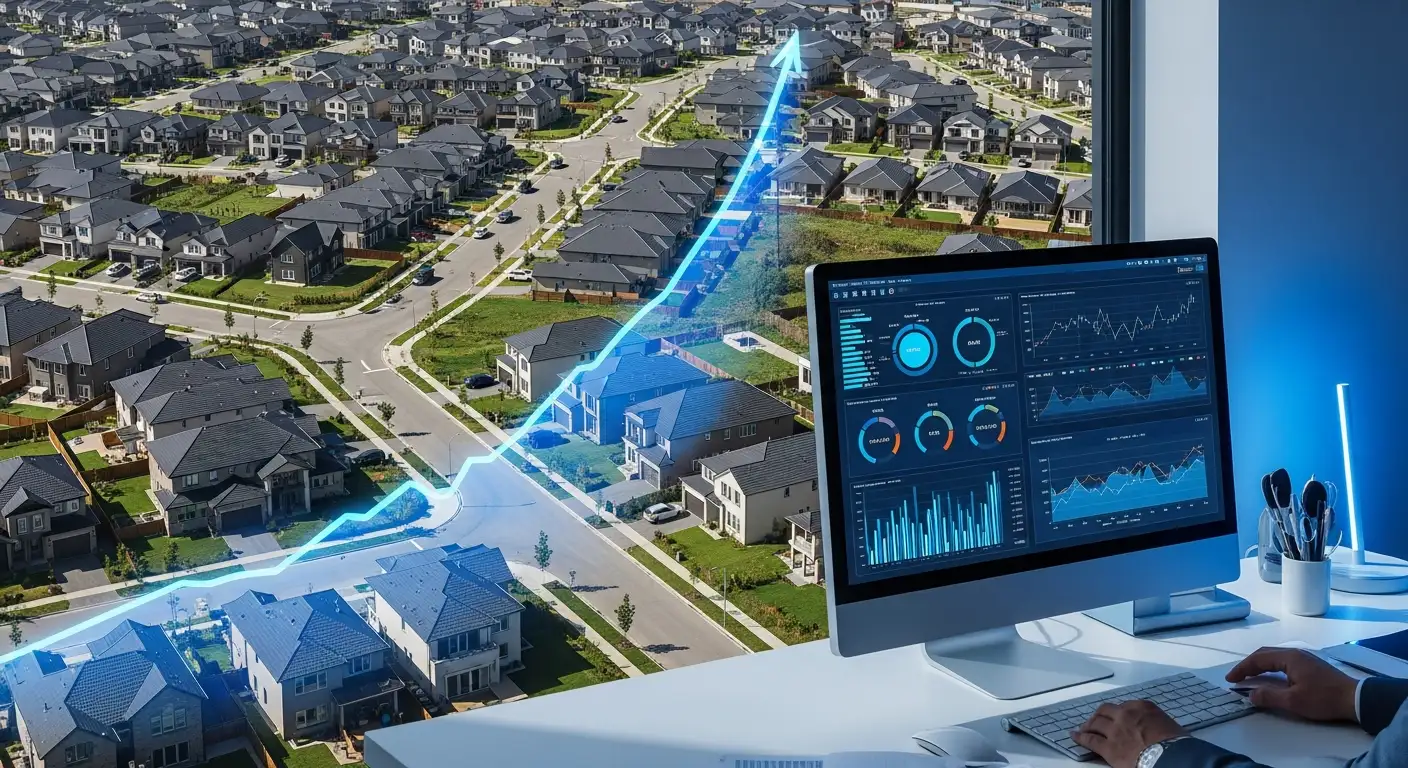Understanding Mortgage Lending for the Self-Employed
With self-employment on the rise, more individuals are seeking home loans without traditional W2 income documentation. Lenders approach these applications with extra scrutiny, requiring comprehensive proof of income stability, financial health, and creditworthiness. This article explores the key mortgage lending criteria specifically tailored for self-employed borrowers to help them navigate the process confidently and effectively.
Documentation Requirements for Self-Employed Mortgage Applicants
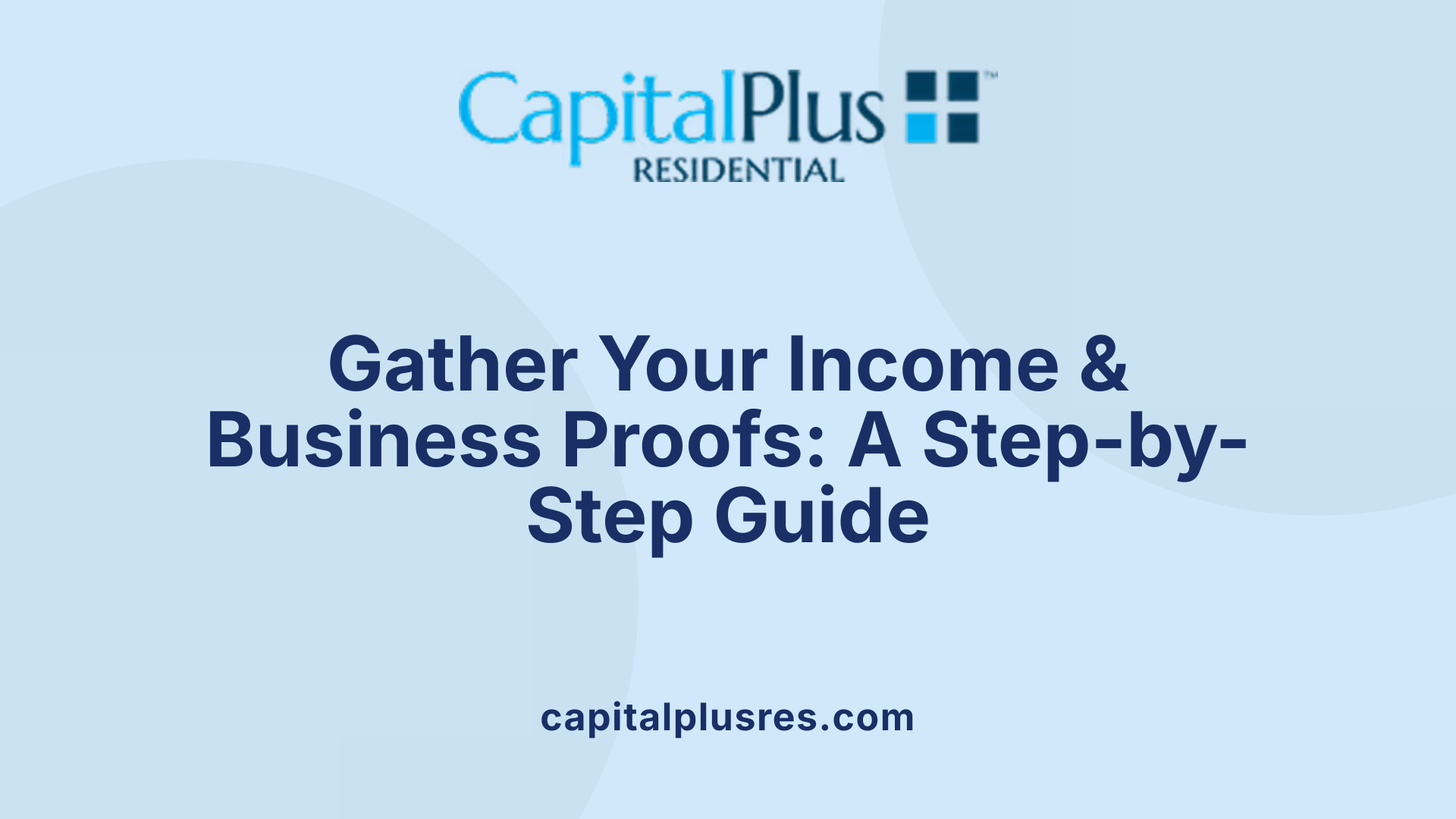
Types of documents needed
Self-employed mortgage applicants must provide comprehensive documentation to demonstrate income stability and business viability. Commonly required documents include personal and business tax returns, profit and loss statements, bank statements, and proof of employment such as business licenses. These documents help lenders assess the borrower's income consistency and the financial health of their business.
Proof of income and business health
Lenders rely on detailed financial documents to verify that a self-employed borrower's income is stable and sufficient for loan repayment. This verification includes reviewing net income—income after deducting business expenses—usually averaged over 1-2 years. Profit and loss statements and bank statements are analyzed to confirm cash flow and ongoing business operations.
Role of tax returns, profit and loss statements, bank statements, and business licenses
Tax returns serve as the primary evidence of income history and are carefully examined for income trends and deductions. Profit and loss statements provide real-time insights into business performance, while bank statements support proof of consistent deposits and cash inflows. Business licenses authenticate the legitimacy of the enterprise, supporting the borrower's employment and income claims.
Additional documentation for COVID-19 regulations compliance
Due to pandemic-related lending adjustments, some lenders require audited or unaudited profit and loss statements alongside updated business bank account statements to ensure continued income stability during uncertain times. These extra documents complement standard paperwork and address the potential impact of COVID-19 on business finances.
Proper preparation and submission of these documents can streamline the mortgage approval process for self-employed individuals, demonstrating their financial responsibility and lending eligibility.
Income Verification and Stability: What Lenders Look For

Two-Year Self-Employment History Requirement
Most mortgage lenders require self-employed borrowers to demonstrate a steady history of self-employment for at least two years. This period helps lenders assess the borrower's income stability and the likelihood of continued earnings necessary to make mortgage payments.
Alternatives for Borrowers with Less Than Two Years of Self-Employment
If a borrower has been self-employed for less than two years, some lenders may still consider their application. This usually requires proof of 12 months of current business income, plus a demonstrated work history of at least 24 months in the same industry or related professional education and certifications.
Assessment of Net Income After Business Expenses
Lenders typically evaluate the borrower's net income, which is the revenue remaining after subtracting business expenses. This net income is essential for determining the borrowing capacity. Accurate documentation like profit and loss statements and tax returns is critical to reflect this.
Cash Flow Tools and Income Analysis
To further understand income stability, lenders may use cash flow analysis tools such as Fannie Mae’s Cash Flow Analysis (Form 1084). These tools analyze income trends and seasonal fluctuations, providing a comprehensive view of the borrower's ability to sustain mortgage payments.
Income Averaging Over 1-2 Years
Income from self-employment is often averaged over one to two years based on tax returns. This approach smooths out any fluctuations or anomalies in income, giving lenders a realistic estimate of ongoing earnings.
Evaluating Rental and Other Income Sources
In addition to business income, lenders consider other income sources such as rental income. Documentation like leases, rental agreements, and proof of received payments are required to verify these additional incomes and incorporate them into loan qualification.
These rigorous income verification steps help lenders build confidence in the financial stability of self-employed borrowers, ensuring they can successfully manage mortgage obligations.
Credit Scores, Debt-to-Income Ratios, and Financial Strength

What are the minimum credit score requirements for different loan types?
Mortgage lenders set various minimum credit score thresholds depending on the loan type. Conventional loans usually require a minimum credit score of 620. FHA loans are more lenient, allowing scores as low as 500, provided a 3.5% down payment is made. VA loans do not have a mandatory minimum credit score, catering mainly to military personnel, while USDA loans also typically waive down payments but apply income limits and location restrictions. Non-QM loans offer flexibility in credit score criteria, making them accessible to self-employed borrowers with irregular income.
What are the ideal debt-to-income (DTI) ratios for self-employed borrowers?
Lenders favor lower debt-to-income ratios for self-employed applicants due to income variability. An ideal DTI is generally below 36%, although some lenders might accept up to 43-50% if other qualifications are strong. For self-employed borrowers, keeping the DTI well below these caps improves the chances of loan approval.
Why is managing debt and maintaining savings or reserves important?
Maintaining manageable debt levels and sufficient cash reserves signals financial stability to lenders, especially for those with fluctuating income. Savings and reserves can cover mortgage payments during lean periods and may be required by lenders as part of the loan qualification process for self-employed individuals.
How do credit scores and financial strength impact mortgage approval and interest rates?
Higher credit scores (720 or above) enhance mortgage eligibility and often secure better interest rates. Conversely, lower scores or high DTI ratios may lead to higher rates or loan denials. Making larger down payments reduces loan-to-value ratios, further improving loan terms.
What role do co-signers and co-borrowers play in mortgage qualification?
Including a co-signer or co-borrower can bolster an application by sharing financial responsibility. Co-signers assure the lender of repayment capacity without claiming ownership, which can be especially helpful if the primary borrower has insufficient credit history, higher DTI, or less stable income.
| Factor | Requirements for Self-Employed Borrowers | Explanation |
|---|---|---|
| Credit Score | 620+ for Conventional, 500+ for FHA, no minimum for VA | Better scores improve loan terms and approval chances |
| Debt-to-Income Ratio (DTI) | Ideally under 36%, up to 43-50% in some cases | Lower DTI indicates manageable debt and income stability |
| Savings/Reserves | Required by many lenders, especially for variable income | Provides financial buffer during income fluctuations |
| Co-Signers/Co-Borrowers | Can improve loan prospects without requiring ownership | Adds financial security and may compensate for weaker credit |
Understanding these financial benchmarks guides self-employed borrowers in preparing stronger mortgage applications, optimizing both approval odds and borrowing costs.
Mortgage Options Available to Self-Employed Borrowers
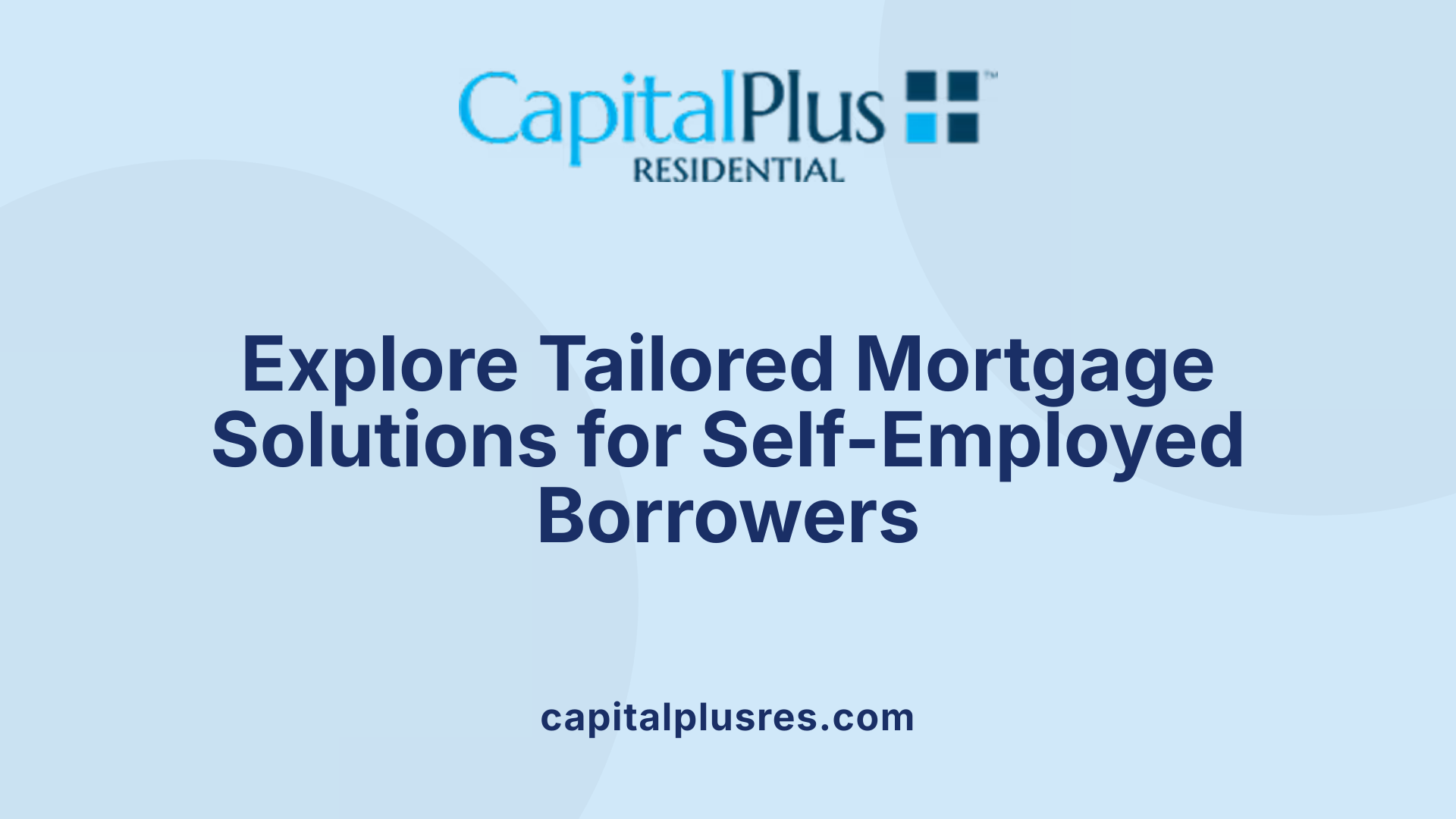
Conventional Loans
Conventional loans are a common choice for self-employed borrowers, typically requiring a minimum credit score of 620 and a down payment of at least 3%. These loans rely on traditional documentation such as tax returns and bank statements to verify income, often averaging income over the past 1-2 years. For self-employed individuals, a lower debt-to-income (DTI) ratio is preferred to improve approval chances.
FHA, VA, and USDA Loans
Specialty loan programs provide alternatives with varied criteria. FHA loans require a minimum credit score of 500 and a down payment of 3.5%, making them accessible to borrowers with less established credit histories. VA loans are available exclusively to military personnel, offering the benefit of zero down payment and no minimum credit score requirement. USDA loans target buyers in rural areas and also allow zero down payment but impose income limits.
Non-QM Loans and Bank Statement Loan Programs
Non-Qualified Mortgage (Non-QM) loans offer flexibility for self-employed borrowers with irregular incomes that might not fit traditional lending standards. Bank statement loans are a popular type of Non-QM loan; they evaluate income based on cash flow shown in 12 to 24 months of bank statements rather than relying solely on tax returns. This option is particularly helpful for those whose tax documents may underestimate income due to allowable business deductions.
Down Payment Expectations and Impact on Approval
Making a larger down payment can significantly enhance loan approval prospects. A down payment of 20% or more not only reduces the loan-to-value ratio but can also eliminate the need for private mortgage insurance (PMI), making the loan more affordable overall. Self-employed borrowers aiming to strengthen their mortgage applications often benefit from maximizing their down payment.
Flexibility of Non-Traditional Mortgage Products
Several mortgage options cater specifically to the diverse needs of self-employed borrowers. These options consider different documentation methods and income verification techniques to accommodate business fluctuations and non-traditional income sources. By exploring conventional, government-backed, and Non-QM loans, borrowers can find tailored solutions that fit their financial realities.
| Mortgage Type | Credit Score Requirement | Down Payment Requirement | Income Verification Method |
|---|---|---|---|
| Conventional | Minimum 620 | 3% or more | Tax returns, bank statements, profit and loss statements |
| FHA | Minimum 500 | 3.5% | Tax returns, less stringent credit requirements |
| VA | No minimum | No down payment | Military eligibility, alternative documentation accepted |
| USDA | No minimum | No down payment | Income limits, rural location required |
| Non-QM / Bank Statement | Flexible | Varies | Bank statements over 12–24 months, cash flow analysis |
Separating Business and Personal Finances: Best Practices
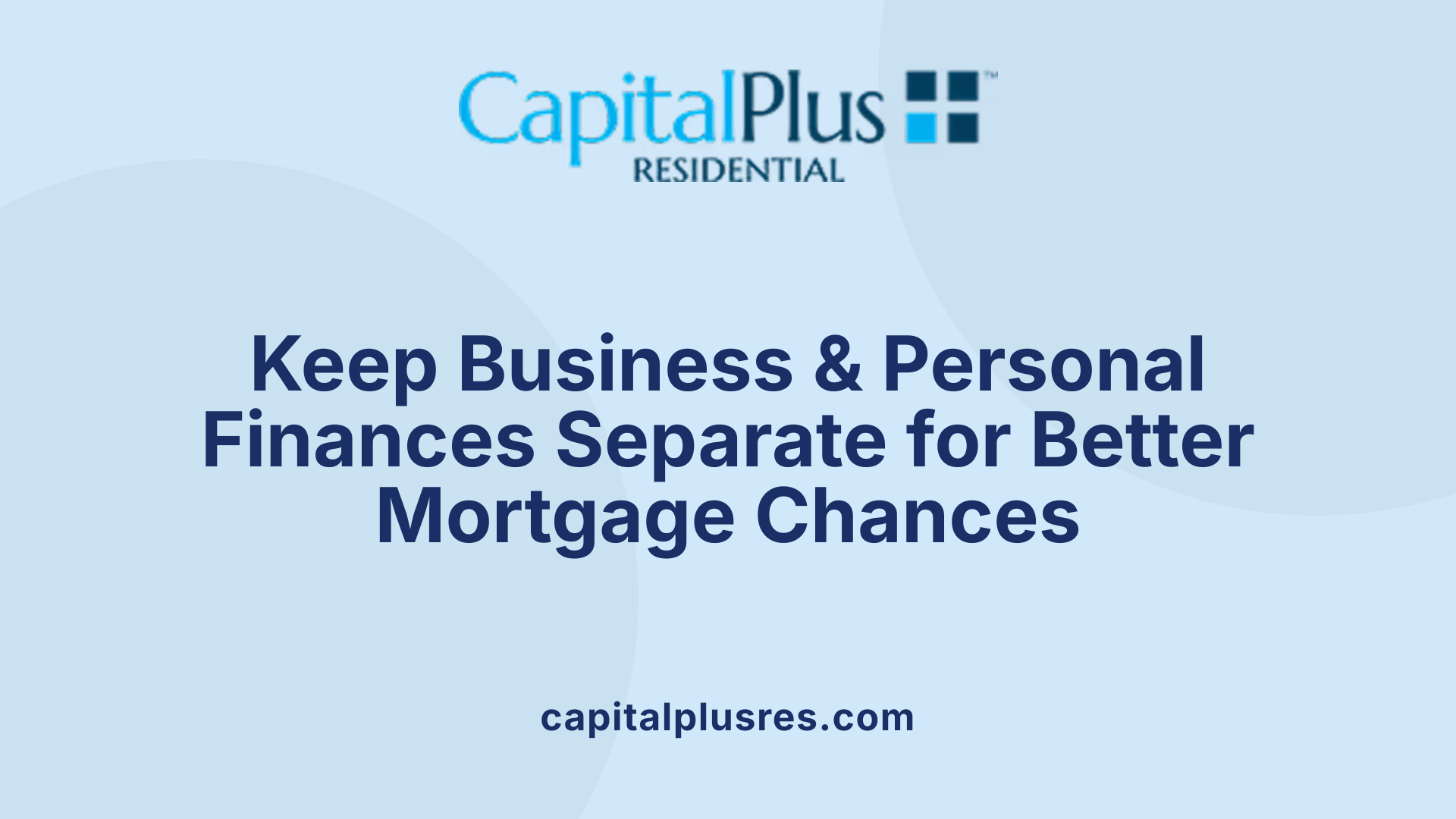
Opening Dedicated Business Bank Accounts
One of the fundamental steps for self-employed individuals is to open a separate business bank account. This distinction keeps business transactions distinct from personal ones, allowing clearer tracking of income and expenses. It also demonstrates to mortgage lenders that your business finance management is organized and professional.
Obtaining a DUNS Number
Acquiring a DUNS (Data Universal Numbering System) number provides a unique identifier for your business recognized by many financial institutions and vendors. It helps in establishing your business’s credit profile, which can be a strong indicator of financial stability to lenders during mortgage evaluation.
Establishing Utility and Vendor Accounts in Business Name
Setting up utility accounts, vendor contracts, and other operational accounts under your business name rather than your personal name further solidifies the separation. This practice clarifies which expenses belong to your business and which are personal, supporting accurate income documentation.
Benefits for Mortgage Application and Income Clarity
Separating finances benefits your mortgage application by providing clear, verifiable documentation of business income and expenses. Lenders require detailed evidence to assess self-employed income, and distinct accounts help demonstrate reliable revenue streams, making the approval process smoother.
Avoiding Commingling Funds to Ease Documentation
Mixing personal and business funds complicates income verification and can raise red flags with lenders. Commingling can obscure the true financial picture of your business, leading to delays or denials. Maintaining separation simplifies paperwork, reduces lender scrutiny, and strengthens your mortgage application.
By adopting these practices, self-employed borrowers provide lenders with transparent financial records, improving the chances of mortgage approval and reducing the stress of additional documentation requests.
Strategies to Improve Mortgage Approval Odds for the Self-Employed
Maximizing Down Payment to Reduce Loan-to-Value Ratio
Making a larger down payment, ideally 20% or more, can significantly improve mortgage approval chances for self-employed borrowers. A substantial down payment lowers the loan-to-value (LTV) ratio, which reduces the lender’s risk and can eliminate the need for private mortgage insurance (PMI).
Improving Credit Scores Before Application
A strong credit score enhances eligibility and favorable loan terms. While many lenders require a minimum score of 620 for conventional loans, aiming for 720 or higher can boost approval odds. Self-employed individuals should review their credit reports and address any negative items well before applying.
Managing Debt-to-Income (DTI) Ratios Effectively
Lenders prefer DTI ratios below 36%, though some allow up to 43-50%. Keeping debts manageable relative to income improves the likelihood of loan approval. Self-employed borrowers should pay down debts and avoid new obligations prior to applying.
Using a Co-Signer or Co-Buyer
Bringing in a co-signer or co-buyer with strong credit or income can help applicants meet lender criteria. The co-signer assumes repayment responsibility but doesn’t claim ownership, providing an extra layer of assurance to the lender.
Providing Thorough and Organized Documentation
Self-employed borrowers must supply comprehensive paperwork such as personal and business tax returns, bank statements, profit and loss statements, and possibly CPA letters or business licenses. Organizing these documents clearly and professionally facilitates a smoother underwriting process.
Ensuring Consistent and Stable Income Presentation
Lenders usually require two years of steady self-employment income. Demonstrating stable or growing income over this period, or supplementing with relevant work history or education if less than two years, reassures lenders of reliable repayment capability.
By combining these strategies, self-employed individuals can greatly enhance their chances of securing a mortgage with favorable terms.
Understanding Lender Assessment: Beyond Documents
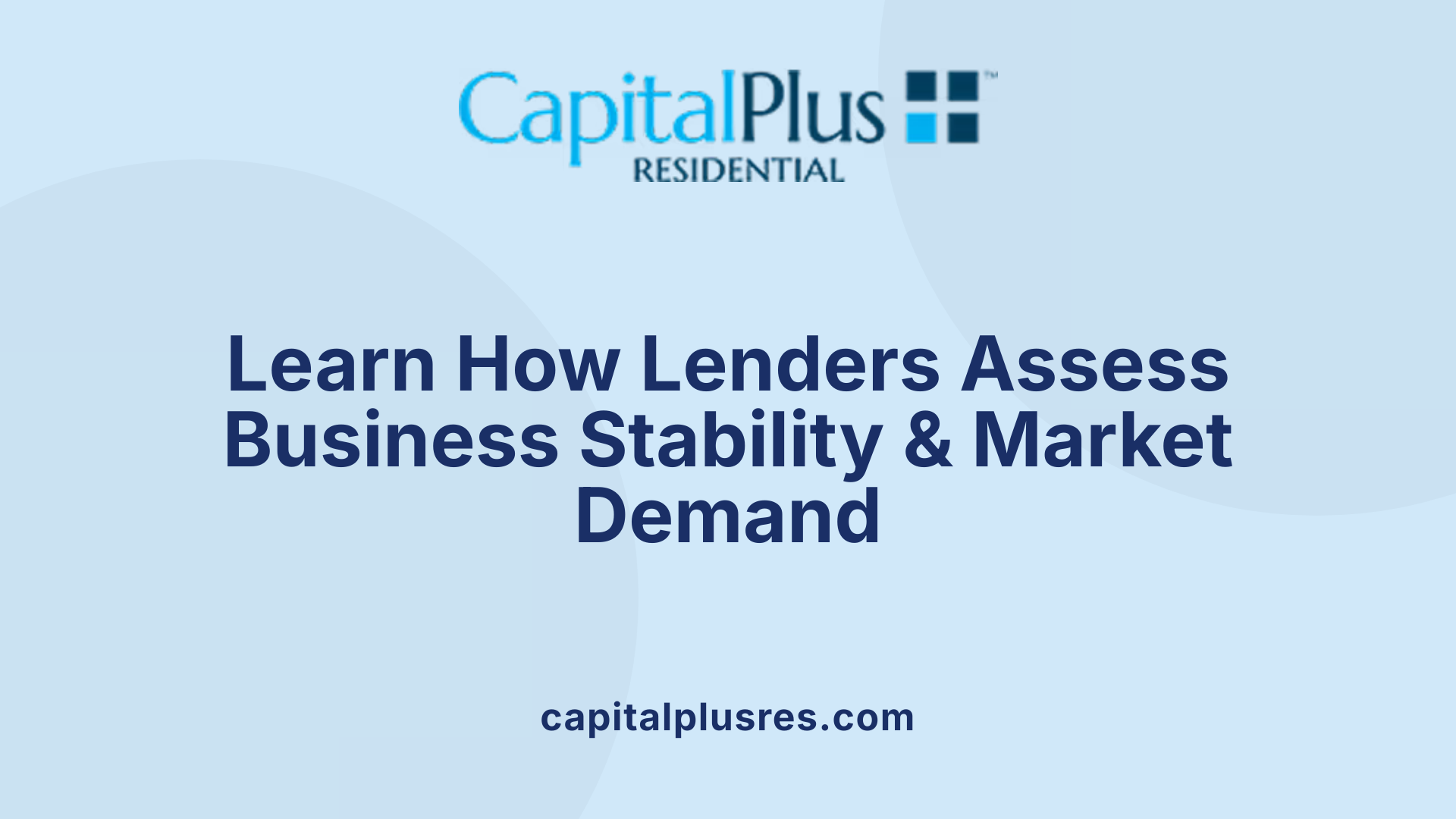
How Do Lenders Evaluate Business Longevity and Market Demand?
Mortgage lenders look closely at the stability of your business, including its longevity and the demand for the products or services it offers. Businesses with a solid operating history and a consistent or growing customer base demonstrate stability, which increases confidence that income will continue. This evaluation includes reviewing the type and location of your business, understanding market trends, and assessing how those factors impact future income prospects.
What Role Does Financial Strength Play in Mortgage Qualification?
Lenders assess the financial health of your business by examining profit and loss statements, tax returns, and bank statements. They consider not just current income but also projections to determine the likelihood of sustained income. Additionally, if you're using business assets for down payments or reserves, lenders verify that withdrawing these funds won’t jeopardize the business’s operational stability, which could adversely affect your mortgage application.
How Are Business Withdrawals Viewed During Loan Evaluation?
Withdrawals from business accounts could impact your loan qualification if they threaten the business’s financial endurance. Lenders might request detailed documentation to ensure that such withdrawals won’t hinder the company’s ability to generate income. This ensures your loan doesn’t inadvertently jeopardize your business’s stability or income continuity.
What is Verbal Verification of Employment (VOE) and Its Importance?
VOE is a process where lenders confirm your ongoing self-employment and business activity through direct communication, often by phone, with you or your accountant. This step helps verify that your business continues to operate as represented in your submitted documents. It safeguards against income gaps and supports the lender’s confidence in your repayment ability.
How Has COVID-19 Influenced Lender Evaluation Procedures?
The pandemic brought unique challenges, prompting lenders to request audited or unaudited profit and loss statements, along with recent business bank account statements. These provide real-time insights into your business’s current financial health amidst uncertain economic conditions. Such adjustments ensure that lenders accurately assess your ability to sustain income and repay your mortgage despite market volatility.
Key Takeaways for Self-Employed Mortgage Seekers
Securing a mortgage as a self-employed individual presents unique challenges, but with proper planning and understanding of lender criteria, approval is attainable. Providing thorough documentation, maintaining strong credit, managing debt prudently, and choosing suitable loan products form the foundation of a successful application. By separating business from personal finances and demonstrating income stability, self-employed borrowers can improve their chances significantly. Awareness of available mortgage options and proactive financial management ultimately empower self-employed individuals to achieve homeownership despite nontraditional income sources.
References
- Requirements for Self-Employed Mortgage Borrowers
- Self-Employed Mortgage Loan | Requirements 2025
- B3-3.2-01, Underwriting Factors and Documentation for a ...
- Getting a mortgage when self-employed: Learn how to qualify
- Self-Employed Mortgage Clients: What You Need to Know
- Mortgage Planning for Self-Employed Borrowers
- Mortgage options for self-employed borrowers


